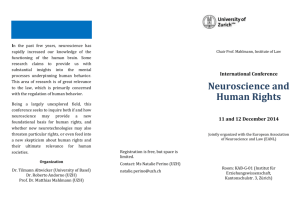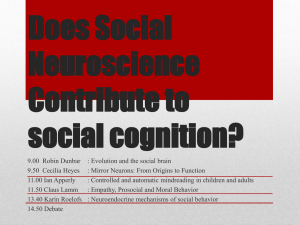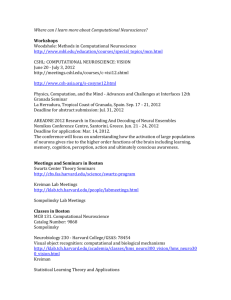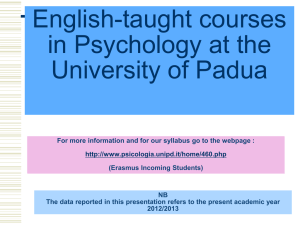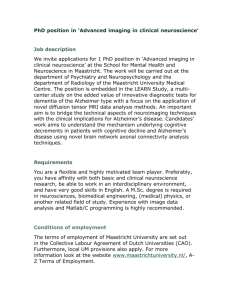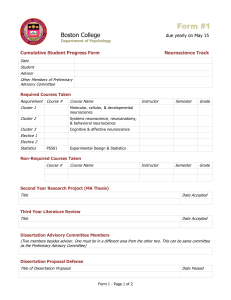New Program Guide - Teachers College Columbia University
advertisement
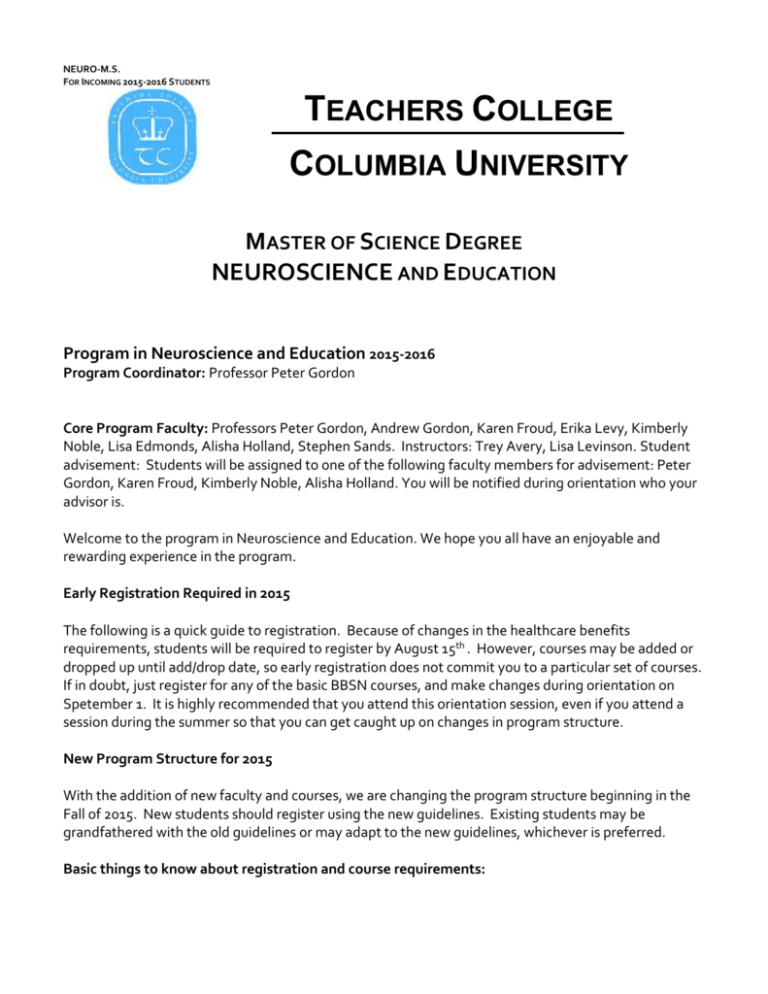
NEURO-M.S. FOR INCOMING 2015-2016 STUDENTS TEACHERS COLLEGE COLUMBIA UNIVERSITY MASTER OF SCIENCE DEGREE NEUROSCIENCE AND EDUCATION Program in Neuroscience and Education 2015-2016 Program Coordinator: Professor Peter Gordon Core Program Faculty: Professors Peter Gordon, Andrew Gordon, Karen Froud, Erika Levy, Kimberly Noble, Lisa Edmonds, Alisha Holland, Stephen Sands. Instructors: Trey Avery, Lisa Levinson. Student advisement: Students will be assigned to one of the following faculty members for advisement: Peter Gordon, Karen Froud, Kimberly Noble, Alisha Holland. You will be notified during orientation who your advisor is. Welcome to the program in Neuroscience and Education. We hope you all have an enjoyable and rewarding experience in the program. Early Registration Required in 2015 The following is a quick guide to registration. Because of changes in the healthcare benefits requirements, students will be required to register by August 15th . However, courses may be added or dropped up until add/drop date, so early registration does not commit you to a particular set of courses. If in doubt, just register for any of the basic BBSN courses, and make changes during orientation on Spetember 1. It is highly recommended that you attend this orientation session, even if you attend a session during the summer so that you can get caught up on changes in program structure. New Program Structure for 2015 With the addition of new faculty and courses, we are changing the program structure beginning in the Fall of 2015. New students should register using the new guidelines. Existing students may be grandfathered with the old guidelines or may adapt to the new guidelines, whichever is preferred. Basic things to know about registration and course requirements: 1. The MS degree requires that you take 32 graduate degree credits at Columbia University, of which 20 must be taken at Teachers College (i.e., you can take up to 12 of your credits at other locations in the university such as Columbia Graduate School of Arts and Sciences (GSAS), Barnard College, Columbia Medical School (College of Physicians and Surgeons) etc.) For example, courses taken in the Psychology Department on the Main Campus are GSAS rather than Teachers College. Such courses can be registered through TC, but do require permission of the instructor, so make sure you are prepared in advance. Columbia College undergraduate courses at the entry level (1000, 2000 level) cannot be used to fulfill graduate degree requirements. Advanced undergrad courses can be petitioned for program course credit with the registrar, but this is not automatic. Graduate courses (4000 and above, or preceded with G) can count for credit in the program. If you are considering enrolling in advanced graduate courses in neuroscience, biology etc. outside of TC, please be sure that you have the sufficient prerequisites and background training to handle the content. If in doubt, speak with the instructor and/or your advisor. Many of these courses are very rigorous and require a solid preparation in the area of study. Students may end up failing these courses if they overestimate their preparation. 2. The program requirements consist of the following: A. Core Requirements: At least 20 credits of courses in Neurosciences and data analysis. These are primarily offered in the Neuroscience and Education program (BBSN prefix). Students entering with previous neuroscience background may substitute more advanced neuroscience courses from other Columbia University Colleges (Medical School, Main Campus, Barnard etc.) with permission of the instructor and their advisor. B. At least 9 credits in Methods and Data Analysis. Some courses may overlap with the requirements in A. Previous undergraduate or graduate coursework in this area may be petitioned to fulfill these requirements, but credits cannot be transferred from other institutions. Please consult your advisor if you wish to fulfill requirements in this way. C. BBSN 5575 Proseminar is required for all students in their first Fall term. Exceptions must be approved by the advisor. BBSN 5XXX Capstone and Thesis is highly recommended for students in their final Spring term unless there are other forms of thesis advice such as mentorship with a sponsor of a practicum experience. D. Breadth Courses: At least 6 credits of breadth courses outside of BBSN. Most out of program courses qualify for this requirement, and students should consider more than the minimum 6 credits to combine a content area with their neuroscience training. Students with advanced preparation who wish to focus on advanced courses in Neuroscience offered at the Columbia Medical School and Columbia Graduate School of Arts and Sciences (Main Campus) may count these as their breadth requirement with the permission of their advisor. Such an option is typically taken by students who will be applying to doctoral programs following the Masters degree at Teachers College. E. The Thesis is required to be completed by all students before graduation. This is a journal-style article in APA format that either reports on research conducted during training or is a review article that consists of an integrated analysis of an area of focus. Review articles should be proposing a hypothesis or point of view in the analysis, and should not just be a listing or previous research in the area. The thesis may also include research proposals for specific experiments to address questions raised in the analysis. Students are strongly encouraged to enroll in BBSN 5XXX Capstone and Thesis, to provide guidance and feedback in the writing of the thesis. F. BBSN 4904 Practicum is strongly recommended for all students, especially those pursuing a research/scientific approach to their studies. Typically this consists of working/volunteering in a research lab or treatment center in the city. Such experiences can be very rewarding and are extremely useful for future employment and can often lead to publications if the student is highly engaged in a lab project. Students who are engaged in practicum should register for the practicum for 0-3 points. A zero-point enrollment allows the student to get credit for participation without paying tuition. EXCLUDED COURSES: Undergraduate courses generally cannot count toward the graduate degree (see not above.) Courses that do not fulfill the program aims of connecting neuroscience to a content area may not count toward the degree. Also courses that offer non-traditional or alternative approaches to neuroscience may not be allowed to count toward your degree if they are not considered to be scientifically rigorous. Students should consult their advisor if in doubt. Please note that to remain in good standing, students are expected to obtain a grade of B or better in the intro-level courses in neuroscience (Foundations and Cognitive Neuroscience) or Brain and Behavior I and II. If students substitute undergraduate courses for these requirements, then a B grade or better is also required on their transcript. Students who fail to obtain a B grade in these courses will be required to repeat them. Websites for Registration and Course Selection Teachers College Biobehavioral Sciences , Human http://www.tc.columbia.edu/tc-schedule/schdsearch.cgi Development & Other Departments Bases on Specialization Columbia University Directory of Classes Columbia University GSAS Graduate Program in Psychology College of Physicians & Surgeons Ph.D in Neurobiology & Behavior http://www.columbia.edu/cu/bulletin/uwb/ http://www.columbia.edu/cu/psychology/dept/curriculu m/index.html Note: Only 3000 level (graduate) classes and above http://www.neurosciencephd.columbia.edu/index.php? page=8 Note: Special Registration Required, Classes on Different Schedule than TC Updating the Academic Progress Spreadsheet All students in the program will have access to a moodle site in which they will be required to update their progress in the program during their studies at TC. Progress reports will be visible to advisors and will be the basis for monitoring of student progress. Available courses for program requirements: ** Required for all students * Required for students in first term unless substituted by previous coursework ^ On-line course # Daytime lectures video recorded and offered on-line Course Number Course Name A. MINIMUM 20 CREDITS REQUIRED IN BBSN PROGRAM (including BBSN methods courses) FALL TERM BBSN 5575 **Proseminar in Neuroscience and Education BBSN4003 *Foundations of Neuroscience BBSN4000 *Cognitive Neuroscience BBSN4005 *Neuroscience Methods I BBSN 4007 #Applications of Neuroscience to Education BBSN5122 ^Psychoneuroimmunology & Education BBSN 5005 Evaluation of Neuropsychological Instruments for Research BBSN 5199 #Neuroscience of Reading BBSN 4904 Practicum / Res Ind Stdy CCPX 4199 Neuroscience and Psychopharmacology SPRING TERM BBSN 5XXX BBS5068 BBS5069 BBSN5070 BBSN 5199 BBSN 5044 BBSN 5XXX BBSN 5199 BBSN 4904 Capstone and Thesis writing in Neuroscience and Education *Brain & Behavior 1 *Brain & Behavior 2 #Developmental Cognitive Neuroscience #Affective Neuroscience Current Issues in Neuroscience #Neuroscience of Adversity ^Human Functional Neuroanatomy Practicum / Res Ind Stdy B. Neuroscience Research Methods and Statistics (MINIMUM 9 CREDITS) BBSN4XXX Neuroscience Methods I BBSN 5XXX Capstone and Thesis in N&E BBSN5199 Eye Tracking Methods BBSN5005 Evaluation of Neuropsychological Instruments BBSN 5000 EEG Methods BBSN 6000 EEG Data Collection and Analysis BMEN E4840 Functional Imaging of the Brain MARTINOS CENTER ***WorkShops in fMRI, NIRS etc. (external courses offered in Boston MGH: Can count as credit for this requirement) Other courses qualifying for credit under B. Research Methods and Stat Courses offered in the program in measurement and Statistics (HUDM) HUDK 5040 Core Methods in Educ. Data Mining HUDM4120 Basic Concepts in Statistics HUDM4121 Intermediate Statistics HUDM4050 Introduction to Measurement (elementary statistics) HUDM5122 Appled Regression (Advanced) HUDM5123 Linear Models and Experimental Design (Advanced) HUDM6122 Multivariate Analysis (very advanced) Breadth Courses MINIMUM 6 CREDITS REQUIRED Students may choose courses as they wish from other programs at TC or Columbia, while respecting the provisions of the excluded courses section (see above). The following are suggestions for breadth courses from the Human Development/ Cognitive Studies Programs Developmental Psychology HUDK5024 HUDK 4023 HUDK5023 HUDK4027 HUDK4020 HUDK4024 Early Language Development Dev Psych: Adolescence Cognitive Development Development of Mathematical Thinking Theories of Human Development Developmental Psychology HUDK 4035 Technology and Human Development HUDK 5020 Development of Creativity HUDK 5037 Psych of Children's TV HUDK 5040 Dev Psychopathology: Atypical Contexts HUDK 5120 Dev of Creativity: Case Study Method Learning & Cognition HUDK4015 Psychology of Thinking HUDK4029 Theories of Human Cognition & Learning HUDK5096 Psychology of Memory HUDK 5025 Spatial Thinking HUDK 5030 Spatial Explanations HUDK 4080 Educational Psychology HUDK 5035 Psych of Media HUDK 5120 Psych of Language and Reading HUDK 5125 Cross Cultural Psychology
